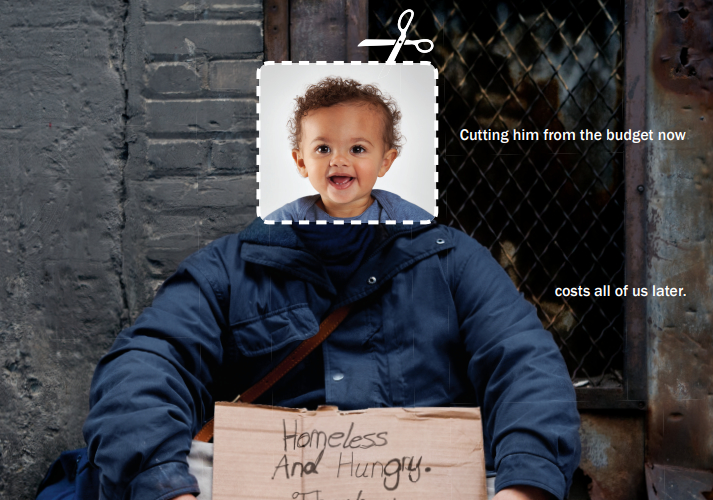By Marian Wright Edelman
Some years ago, the award-winning agency Fallon Worldwide created a series of ads for a pro bono Children’s Defense Fund campaign called “Be Careful What You Cut” that warned sharply against budget choices threatening programs on which children and families rely. Striking images accompanied data making the irrefutable economic case that cutting investments in young people’s needs today costs all of us more in the long run. It was a simple message: protect them now, or pay later. The moral and economic imperatives are the same today, but once again, voters are waiting to see if their members of Congress agree.

The Automatic Benefit for Children (ABC) Coalition, which is co-chaired by the Center for the Study of Social Policy and Children’s Defense Fund, is a group of national, state, and grassroots organizations advocating for a child allowance, or a guaranteed income for children, that would help families afford the essentials that children need to thrive. Expanding a fully inclusive Child Tax Credit would be a step toward that goal. But right now, instead of advancing this kind of positive investment in children and families, Congress is considering devastating cuts to programs that keep young people and their families fed, housed, healthy, and safe, including Medicaid and the Supplemental Nutrition Assistance Program (SNAP). Several members of the ABC Coalition’s Parent Advisory Board recently shared short testimonies about why these programs matter to their families and why they want Congress to make different choices.
Huong Vu, a mother of two in Boston, said Medicaid and SNAP have been a lifeline for her family that helped her and her husband when they needed it most: “Medicaid made sure our kids could see the doctor, and SNAP helped our family to put food on the table. Lawmakers should not cut Medicaid, SNAP, and other programs, because those programs really help families to meet their basic needs. These benefits are not luxuries. They are essential to our life and health.” She added: “Every child deserves an opportunity to thrive.”
Washington, D.C. parent Joseph Yusuf explained how nutrition assistance made a big difference in his own life growing up: “To be honest, if it wasn’t for food stamps, I don’t think I would be right here in this moment talking to you all. While that statement may seem a bit crazy and out there, it’s not. My reality was I grew up in the hood for most of my life. My mom was always at work. My grandmother became my primary caretaker, and for me and my siblings, things were still rough . . . I know what it means to go to bed and be hungry. I know what it means to be angry at the world because you don’t have enough at home.” Yusuf said that instead of taking access to nutrition assistance away from today’s families, he would love to see it increased, along with the Child Tax Credit, which could also be limited under current proposals.
Like Yusuf, Raegen Selden, a Philadelphia mother who is married to her middle school sweetheart, said she was grateful to have had access to SNAP both as a child and now as a parent herself. She put it simply: “I am here to urge lawmakers during this time of budget reconciliation to take off the table cutting programs such as Medicaid and SNAP and put on the table food for our children. Our children not only need these programs, but they deserve these programs. Please reconsider.” She summed up by quoting President Jimmy Carter: “A peaceful world cannot exist with one-thirds rich and two-thirds hungry.”
There is still no reason for anyone, young or older, to be hungry or lack housing or health care in our wealthy nation. Our nation’s greatest deficit is not one of money but of values and priorities. Voters must keep speaking out and letting their elected officials know what they expect, and members of Congress need to be focused on voices like these parents’ as they make decisions that will show children, families, and people everywhere what their true priorities are. Americans are watching. The message remains the same: Be careful what you cut.